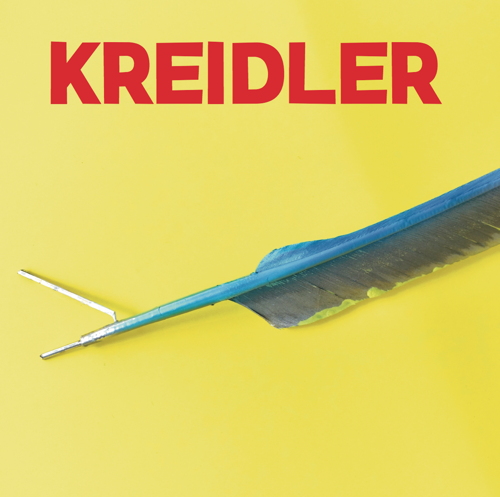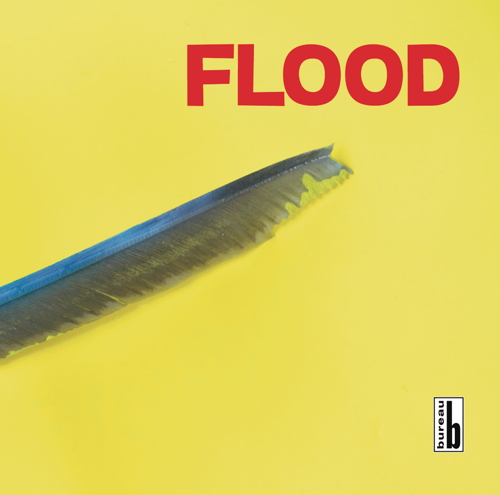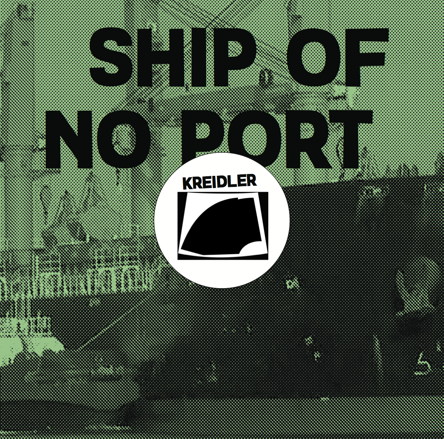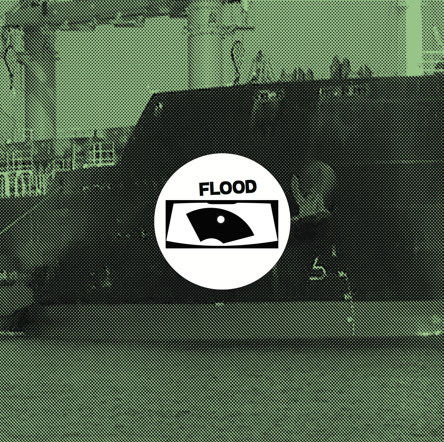

KREIDLER FLOOD

|

|
|
EURYDIKE | CELERATION | NESINDANO | FLOOD I — IV | FLOOD V
|

|

|
|
THOMAS KLEIN ALEXANDER PAULICK ANDREAS REIHSE DETLEF WEINRICH KHOES 1 RICARDO DOMENECK 2
1 »Sida Hoada« poem and voice on NESINDANO by Nesindano Namises
Artwork by ANDERS CLAUSEN and HENRIK OLESEN
Recorded at Kabawil Düsseldorf, Paulick Saal Berlin, 13 Floor Elevator Berlin, and at Lowswing Studio with Guy Sternberg and Benedikt Vogt Published by Tapete Songs | bureau-b | ikreidler | instagram | twitter
(c) & (p) 2019 bureau b & KREIDLER. BB321 |
»Four questions to begin with: What is the pitch of the neoliberal city? How does the pitch of the city construct images of and for the humanity that travels through it?
How does gender relate to control of this space - corporate, commercial, privatised space and the few remaining places we might (often erroneously, or perhaps nostalgically) refer to as "public space"?
How does the soundscape of the city relate to forms of control - what I will call here "soft coercion" - that often goes unnoticed, or at least blends into the background
and becomes simply part of the tapestry of the urban sonic environment, alongside the whirr of traffic, the babble of the crowd, birdsong, sirens?«
(Nina Power, Soft Coercion, the City and the Recorded Female Voice)
|
KREIDLER FLOOD EURYDIKE · CELERATION · NESINDANO ·- FLOOD I — IV · FLOOD V - the song titles of the new KREIDLER album. FLOOD is the frame, though it is a permeable one. ANDERS CLAUSEN and HENRIK OLESEN have placed a feather on the cover and written A SHIP OF NO PORT on the inner sleeve. Movement frozen in luminescent yellow. Green-grey liquefaction. Nature and construct, fluttering. A ship of no ports, not wanting to dock anywhere. Or everywhere: a ship of many ports — openings, open access, outstretched arms. Welcome! This dance is yours! THOMAS KLEIN, ALEXANDER PAULICK, ANDREAS REIHSE, and DETLEF WEINRICH assembled in Düsseldorf in winter of 2018 for recordings, and then continued with further sessions in Berlin. Starting with around a dozen sketches, the band produced eight pieces, including FLOOD I — IV and FLOOD V, an ensemble of five songs that - in LP terms - fills the entire second side of the album. But let's start from the beginning. Side One - still speaking in LP terms - begins pleasantly enough with the gentle roll and slight murmur of EURYDIKE. Borrowed from Greek mythology, the title refers to the pretense of affection as a means of abandonment. Painting scars onto the skin, using self-deception and lies, walking over corpses to flatter stones. We don't need to mention HIS name here, and anyway, the gender is variable. The song is called EURYDIKE: the wistful saxophone, the bass notes, the slight trembling in the sound all speak of her awakening from dis-illusion - from grief that the backward look is no assurance of striding forward together, but only a vis-a-vìs intent to put the other out of the picture then fill it with his own poisonous glory. The song depaints how EURYDIKE transforms her enforced departure into victory, with the quiet certainty that she will never be forgotten.
»Hvis man mildner hjertet i rette tid CELERATION, the second piece, seems to accelerate. But if we listen closely, the pace of EURYDIKE is actually maintained. The tone becomes sharper, the rhythm creaky, the rolling more energetic, the sequence calls for a sacrifice. Wind breaks off, snare strikes, a melody rises out of a dark rumbling, ghosts circle over the city, a heavy yellow freight train rumbles past.
»You can't stop running water«
A shimmy, a scuttle, a quarter step: NESINDANO. The voice we hear is KHOES, alias Nesindano Namises; the language we hear is Khoekhoe/ Damara. A gong, a CR-78 joins, a clicking, a flicker, words flutter, a bass booms, the voice rises up to the hookline, an FM synthesizer picks up the pieces and carries them along, percussion rattles. Agit-Pop! a pronunciamento to dance with the powers, a dance against power: »sida huada, ti a, sa« = all of it is ours, mine and yours!
»I won't be entertaining guests / When my house is flooded mess« Shall we speak of floods where the river overflows in abundance, while one person's shortage becomes another's surplus. FLOOD I - IV is not about modesty or humility. It calls for always demanding the maximum - of oneself and for oneself - which also means to give, and that each may set their own limits while respecting others, accepting them and helping them when asked for help.
»Wir sitzen alle im selben Boot«
RICARDO DOMENECK takes on FLOOD II while looking out over the sea in Brazil, his feet in the sand for a few minutes, recalling a conversation with a geologist: how every single grain spans a space of millions of years. Crushed from stone, purged of rock, washed down by mountains, times and tides. The language we hear is Portuguese. KREIDLER, this four-headed hydra of a continental pop music that captures Bach, Disco, Postpunk, Club and Krautrock in varying proportions with an elegant lightness. On FLOOD the band playfully expands its approach with two renowned voices. We hear language, information. And even though we may not understand them at first, we sense that these are words of weight. An emphasis on what KREIDLER has always been about: the movement of the body - hand in hand with that of the mind. (V. Luxemburgo)
A world where LCD Soundsystem can be an unlikely stadium band is finally ready to embrace Kreidler. (Page Two, Team, LA Weekly) Düsseldorf's 2nd most famous band (for us at least) (Boomkat), Magic, magic stuff (Calvin Bush, Muzik), petrolpunk aesthetic (Charlie Frame, The Clash), — they're getting their hands dirty (Piers Martin, Uncut). |
KREIDLER FLOOD EURYDIKE · CELERATION · NESINDANO · FLOOD I — IV · FLOOD V — so lauten Titel des jüngsten KREIDLER Albums. FLOOD heißt die Klammer, aber sie ist durchlässig. ANDERS CLAUSEN und HENRIK OLESEN haben eine Feder auf das Außencover montiert, A SHIP OF NO PORT auf das Innencover geschrieben. Strahlengelb eingefrorene Bewegung und grüngraue Verflüssigung. Natur und Konstrukt, ein Flattern. A ship of no ports, Anlegen will man nirgendwo — oder überall: a ship of many ports: Öffnungen, Open Access, ausgebreitete Arme. Seid willkommen! Dieser Tanz ist Euer! THOMAS KLEIN, ALEXANDER PAULICK, ANDREAS REIHSE und DETLEF WEINRICH hatten sich im Winter 2018 in Düsseldorf zu Aufnahmen getroffen, und diese dann in Sessions in Berlin ergänzt, unter anderem im LowSwing Studio von Guy Sternberg, wo KREIDLER bereits zuvor gearbeitet haben. Aus über einem Dutzend Ansätzen hat die Band acht Stücke herauskristallisiert, darunter — um in LP zu sprechen — mit FLOOD I — IV und FLOOD V ein Ensemble aus fünf Songs, das die gesamte zweite Seite des Albums einnimmt. Aber noch einmal von vorne. Seite Eins (um weiterhin in LP zu sprechen) beginnt mit EURYDIKE, ein wohlfälliger Einstieg, ein sanftes Rollen mit einem leichten Raunen. Der griechischen Mythologie entlehnt, ist im Titel der Mechanismus der Zuwendung als Form des Abwendens eingeschrieben. Sich Narbenbildchen auf die Haut kleben, sich und andere belügen, über Leichen gehen, um Steine betören zu können. Wir mögen ihn hier nicht erwähnen, es ist nur ein Name und auch sein Geschlecht ist variabel; das Stück heisst EURYDIKE: das wehmütige Saxofon, das leichte Zittern im Sound, die Bässe sprechen von ihrem Aufwachen aus Ent-Täuschung — von ihrer Trauer, wie ein Blick zurück kein Sich-Versichern ist, kein Verstärken eines gemeinsamen nach vorne Schreitens, sondern nur ein den Anderen, das Gegenüber aus dem Bild stoßen, um es selbst in giftiger Herrlichkeit zu füllen. Das Stück beschreibt wie EURYDIKE ihre gewaltsame Verabschiedung in einen Sieg verwandelt, mit der leisen Gewissheit, dass sie nie vergessen werden wird.
»Hvis man mildner hjertet i rette tid CELERATION, das zweite Stück, beschleunigt. Oder so scheint es, denn nehmen wir es einmal ganz genau, tatsächlich wird das Tempo von EURYDIKE gehalten. Die Klangwelt wird schärfer, der Rhythmus knarziger, das Rollen energischer, die Sequenz verlangt nach einem Opfer. Wind bricht ab, Snare schlägt ein, eine Melodie erhebt sich aus einem dunklen Grollen, Gespenster kreisen über der Stadt, ein schwerer gelber Güterzug drängt vorbei.
»You can't stop running water«
Als drittes: Ein Schlenkern, ein Trippeln, ein Viertelschritt: NESINDANO. Die Stimme, die wir hören, ist die von KHOES alias Nesindano Namises; die Sprache, die wir hören, ist Khoekhoe/ Damara. Ein Gong, eine CR-78 gesellt sich dazu, ein Schnalzen, Worte flattern, ein Bass braazt, die Stimme schwingt sich auf zur Hookline, ein FM-Synthesizer nimmt sie mit. Perkussion rasselt. Agit-Pop!, ein Aufruf zum Tanz mit den Gewalten, ein Tanz gegen die Gewalt: »sida huada, ti a, sa« = Alles ist unseres, meins und deins!
»I won't be entertaining guests / When my house is flooded mess« Sollen wir über Fluten sprechen, wenn der Fluss im Überfluss über das Ufer tritt, wo des einen Mangel des anderen Zuviel ist oder wird. FLOOD I — IV spricht nicht von Bescheidung oder Demut, es spricht davon, immer das Maximale zu fordern, auch von sich, an sich, und das heißt: auch zu geben, und jede*r möge seine Grenzen selbst setzen, und in dieser Forderung den Anderen zu respektieren und als Anderen anzunehmen, und wo er nach Hilfe fragt, zu unterstützen.
»Wir sitzen alle im selben Boot«
RICARDO DOMENECK nimmt sich FLOOD II an und erinnert sich, hinausblickend aufs Meer in Brasilien, an ein Gespräch mit einem Geologen: die Füße im Sand, und wie in diesen paar Minuten doch jedes einzelne Korn einen Raum von Millionen von Jahren umspannt. Zermalmt aus Stein, ausgeschwemmt aus Fels, hinabgespült aus Bergen, Zeiten und Gezeiten. Die Sprache, die wir hören, ist portugiesisch. KREIDLER, diese vierköpfige Hydra einer Popmusik kontinentaler Prägung, die Bach, Disco, Postpunk, Club und Krautrock in wechselnden Anteilen in eleganter Leichtigkeit einfängt, erweitert sich auf FLOOD spielerisch um zwei renommierte Stimmen. Wir hören Sprache, Information. Und auch wenn wir sie zunächst vielleicht nicht verstehen, fühlen wir, dass dies Worte von Gewicht sind. Eine Emphasis dessen, worum es KREIDLER immer schon ging: der Bewegung von Körper — Hand in Hand mit der des Geistes. (V. Luxemburgo)
|